|
|
Posted 11/2/2009 (link)
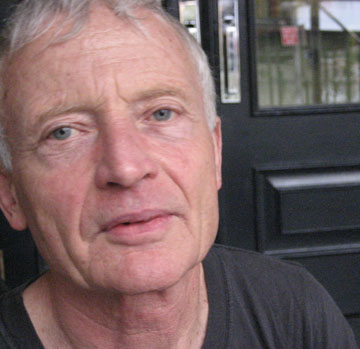 The fall semester keeps rolling along here at UPenn, with one fantastic reading after another at the Kelly Writers House. Today, we're highlighting last week's visit by poet and editor, Robert Grenier, along with another recently-added recording by the poet.
Recorded October 27th, Grenier's reading at the Writers House begins with warm introductions by Al Filreis and Bob Perelman, who observes, "Robert Grenier is, in a number of facets, a major American poet, somebody who has been living the tradition of innovative poetry in this country for decades, and somebody who has been changing that tradition and taking it into quite uncharted territory, that at the same time is bringing up the fundamental questions of literary form, literary ethics, experience of poetry . . . in many ways and in many different poetic incarnations he's been a major and inspirational figure."
Grenier's set, which runs just over an hour, consists of his working through his latest body of work — "a random set of seventy-one images" in the handwritten or "drawn" poem style that he's gravitated towards in recent years — and going back to tell the stories behind select works, inviting participation and dialogue from the audience. We're presenting this reading in two formats: MP3 audio and streaming video (the latter courtesy of KWH-TV), which will allow listeners to view the visual texts alongside his reading and commentary.
This new reading is very nicely complemented by the other recording we've just added: a July 9, 1992 lecture on "Drawing from Nature," at the Naropa Institute's Jack Kerouac School of Disembodied Poetics.
You can hear both of these recordings, and many more — including a 2006 Close Listening reading and conversation with Charles Bernstein (the former devoted to his masterpiece, Sentences), along with readings from Mills College (in 2003) and the St. Mark's Poetry Project (in 1981), plus a 1978 reading whose location is not known. To listen to any and all of these recordings, click on the title above.
Posted 11/4/2009 (link)
 We've twice had the pleasure of announcing new PennSound Classics recordings by UPenn Professor Emeritus John Richetti — including a set of poems by John Dryden this past spring, and selections from Pope and Swift two years ago — however, today, we're tremendously proud to unveil his most exciting set of recordings yet: The PennSound Anthology of Restoration and 18th Century Verse.
A fitting complement to The Cambridge History of English Literature, 1660-1780 (2005), which Richetti edited, The PennSound Anthology of Restoration and 18th Century Verse consists of twenty-one tracks from fifteen authors, including Samuel Johnson, Daniel Defoe, Oliver Goldsmith, Aphra Behn, William Cowper and Lady Mary Wortley Montagu. In a blog post celebrating the collection, PennSound co-director, Al Filreis notes that "[t]his is the first of its kind for this body of writing, so far as we know," and indeed, when ably rendered by a talented performer such as Richetti — who blends the powerful voice of a classically-trained actor with the scholar's robust understanding — the end result is very likely the best of its kind as well.
On the same day as this session, Richetti also recorded parts one and two of Alexander Pope's "An Essay on Criticism," which you can hear — along with the two aforementioned sets and an earlier selection of poems by Pope and Swift — by visiting John Richetti's PennSound author page. To start exploring The PennSound Anthology of Restoration and 18th Century Verse, click on the title above, and don't forget to check out many other fascinating reworkings of canonical texts by David Wallace, Thomas McEvilley, Allen Ginsberg and Caroline Bergvall, among others, on our PennSound Classics homepage.
Posted 11/9/2009 (link)
 Today, we've got a pair of newly-recovered recordings from PennSound co-director, Charles Bernstein — one a recent retrospective set of poems, the other a vintage reading from two decades ago.
First up chronologically is a December 28, 1989 reading at Bick's Books in Washington, D.C.. Recorded by Aldon Nielsen, this recording came to us recently along with several others for PennSound's Heatstrings collection, and after fixing some technical issues (note: a slight fluctuation in volume might still be noticeable), it's all set for your listening pleasure. We've segmented this reading into two parts: first, a fifteen-minute suite of poems from The Nude Formalism (his collaboration with wife Susan Bee, released that same year by Sun and Moon), followed by "How I Painted Certain of My Pictures" (which would eventually appear in 1995's Dark City, also published by Sun and Moon).
Next, we have a set recorded May 28, 2007 in honor of Jerome McGann's seventieth birthday, which was uncovered last week and given its own page. The set includes poems from Bernstein's last major collection, 2006's Girly Man — including "Don't Get Me Wrong," "Wherever Angels Go," "from Canti Antichi" and "Shenandoah" — and the earlier volumes Controlling Interests ("For Love Has Such a Spirit that if It Is Portrayed it Dies"), The Sophist ("The Simply" and "from Lines of Swinburne") and Blind Witness ("Lenny Paschen Redux"), along with "Loneliness in Linden," "Sad Boy's Sad Boy" and "Dea%r Fr~ien%d."
To listen to either of these recordings, follow the links above, and visit Charles Bernstein's author homepage for many, many more recordings from 1969 to the present, including readings, lectures, interviews, videos, Yellow Pages commercials and documentary evidence from the poet's short-lived beatboxing phase (no kidding!).
Posted 11/10/2009 (link)
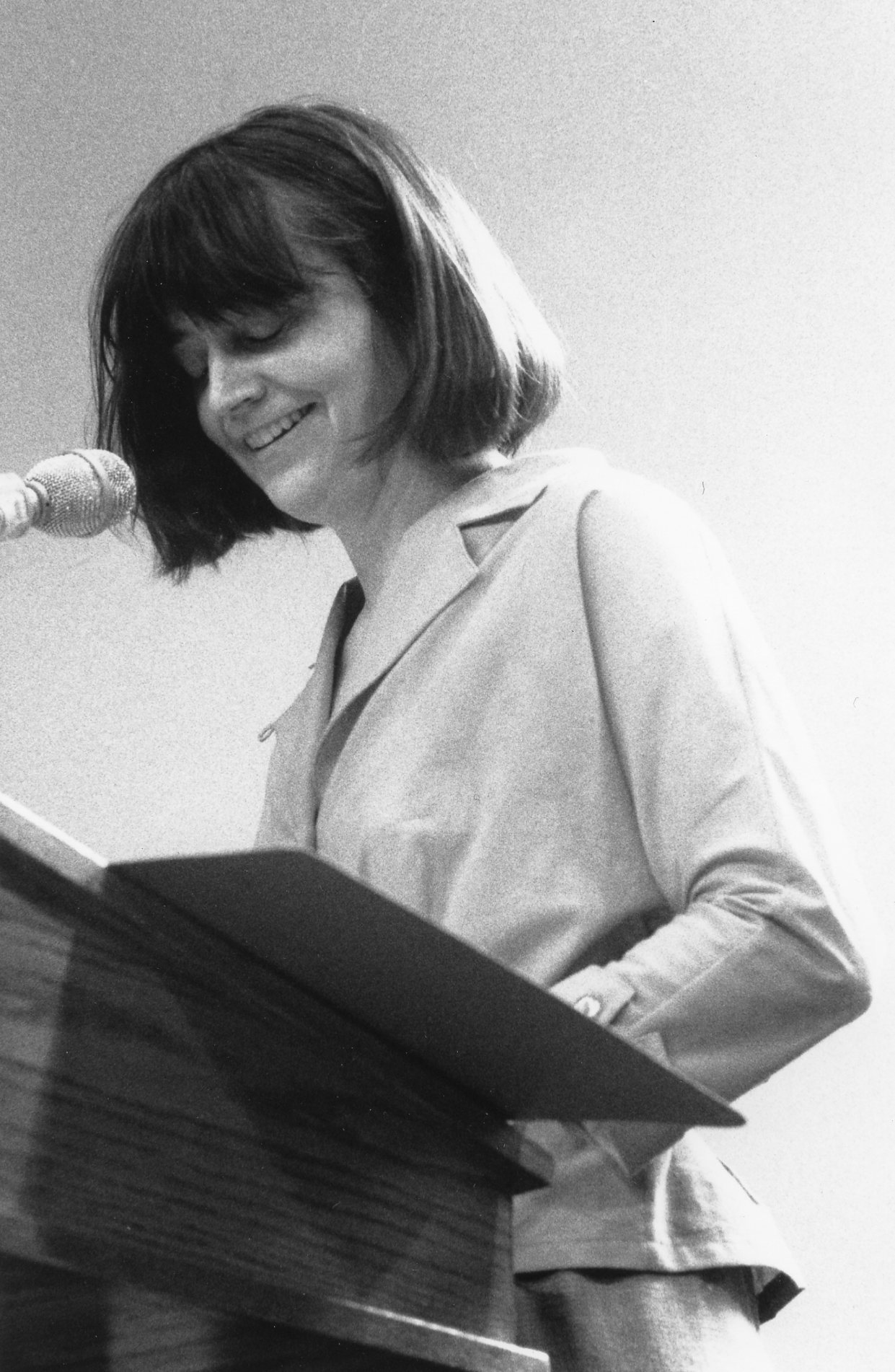 Yesterday, we launched the latest episode in the PoemTalk Podcast Series, number twenty-five overall, which features Alice Notley's "I The People," taken from her 1986 collection, Parts of a Wedding. Joining host Al Filreis for this program are a far-flung group of panelists including erica kaufman, Joe Milutis, and Zack Pieper.
The discussion begins with Milutis, who notes the poem's mystical elements — initially, he doesn't want to deal with these amidst the resounding political content, but comes to see the two as working together as an "agon in American culture between the gnostic impulse behind things and [the] rationality of democracy." Pieper feels "a tender sense of humor" here, particularly in light of Notley's mild embarrassment at the title (admitted in her introductory comments), which threatens to make the work seem either too lofty (via the inflated rhetoric of political speech) or (Filreis adds) too lefty. "What are the politics of the poem?" Filreis asks; Pieper sees it addressing the body, the poet's Lower East Side milieu, mundane mysticism and much more: "I think it's kinda against any sort of exclusivity, against any sense of categorizing those experiences." Kaufman likes this inclusivity, which "give[s] a glimpse of routine thoughts and the way that we interact with our environments," and sees the question of "who or what is the subject" as being at the heart of the poem — "it is the American problem," Filreis agrees, "is it 'e pluribus unum' or the opposite? Is it 'we' or 'I'? Which comes first, the 'I' or the 'we'?" Milutis sees a dialectic between these two positions in American democracy which leads to a slightly problematic polarization between "I" and "the people," with "we" functioning as an interesting middle ground.
Next, the discussion turns to weddings, which appear in both the poem itself and the title of the book in which it was first published. Filreis wonders whether it sets up an analogue between marital bonds and democratic participation, while Milutis, having researched the geography of "10th & A" (at which he finds Tompkins Square Park, the Boy's Club, a Russian Orthodox church and the Horus Café, an Egyptian-themed eatery) and constructs a narrative from those sites. Kaufman instead finds a satire of the trappings of marriage, which brings "certain rights and a certain status." Milutis concedes that the specific address isn't important, and Filreis wonders whether the Lower East Side as both "an exception to the way American has interpreted the Preamble and the getting of happiness" and "exactly the place where democracy gets realized at the level of the body." For Pieper, "personal vision and the realization of that will outride any mode of abstraction forced upon you by a political system" and the poem reinforces this message, specifically through marriage, where clichés and platitudes concerning that institution are countered by Notley's perspective.
Filreis then asks Kaufman to situate "I the People" and its locality within the traditions of the New York School (of which Notley is a key second-generation member) — for her its authenticity is rooted in its clearly stated sense of time and place, as well as its peripatetic, incident-driven nature. He follows up by questioning how the New York School relates to the politics of "I the People," and Kaufman points to the role of gender within NYS discourse and as a perennial element of Notley's aesthetic, often tied to exploration of identity. Returning to the poem's title, Pieper believes that "politics is what happens to people . . . to a person, a single person," and thus all one can offer is her individual perspective on it. Milutis sees America as undergoing "a constant cosmogonical process," which entails a fair amount of self-referential mythologizing.
In conclusion, Kaufman is impressed by the poem's contemporary feel, more than twenty years later, while Pieper marks its technical aspects ("it's both very fluid [...] but yet she uses those clipped phrases") and its dexterity, allowing listeners to focus on one discrete part while being carried along by "different tones and subtle changes." For Milutis, this poem's flow (in spite of its enjambments) is equally powerful, and notes the inclusion of the poem "'In the Dark I'" as a coda in the particular recording discussed here, which complicates one's reading by making it a more democratic expression and also legitimizing the poem as a comment on love.
PoemTalk is a co-production of PennSound, the Kelly Writers House and the Poetry Foundation. If you're interested in more information on the series or want to hear the previous twenty-three episodes, please visit the PoemTalk blog, and don't forget that you can subscribe to the series through the iTunes music store. Our next episode, will feature Filreis and his PennSound co-founder, Charles Bernstein, along with A.L. Nielsen and Michelle Taransky, who'll be discussing Vachel Lindsay's "The Congo." Stay tuned also for future programs in the series which will address poems by Robert Duncan, Jack Spicer, Kit Robinson and William Carlos Williams. Thanks, as always, for listening!
Posted 11/13/2009 (link)
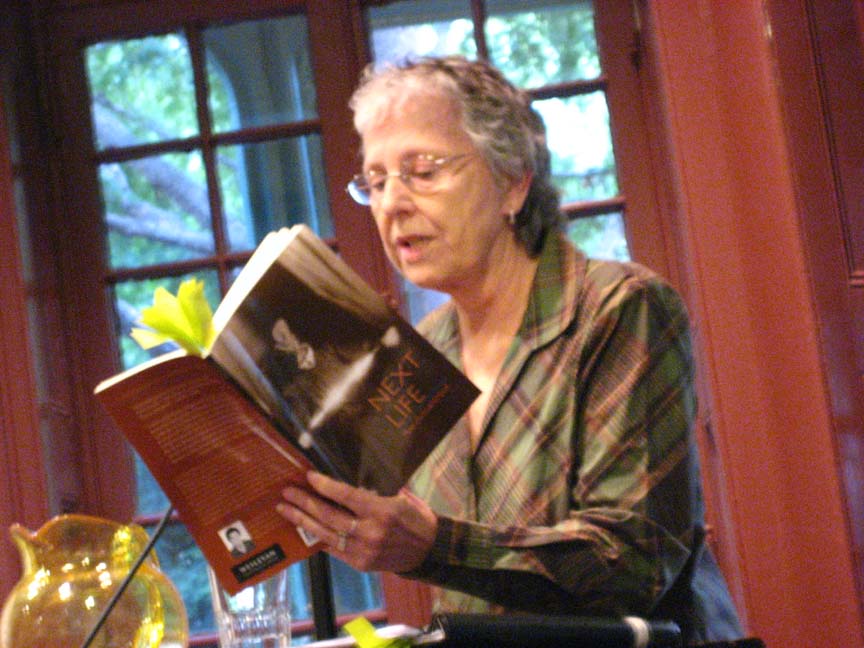 In addition to recent visits by Robert Grenier and Kathleen Fraser, another definite highlight of this fall's reading series at the Kelly Writers House is this October 22nd reading by perennial favorite, Rae Armantrout.
Bob Perelman introduces his longtime friend as "the master of the philosophical line, the San Diego noir syllable, the musical phrase that encompasses life and death deftly, lightly, permanently." Armantrout begins by acknowledging that she read a number of poems from her then-unpublished collection, Versed (Wesleyan, 2009) when last she visited the Writers House in 2007, and that since that recording (and others of material from the new book) are already available on PennSound, "what I decided to do is, by and large, read poems that I didn't read last time and to some extent to read poems from the book that I don't read very often." Titles included in her thirty minute set include "A Resemblance," "Outer," "Operations," "Pleasure," "Worthwhile," "Inscription," "Together" and "Dark Matter."
On Armantrout's PennSound author page, you'll find a wide array of recordings, including several visits to the Kelly Writers House (in 2007, 2004, 2000 and 1998) and numerous Segue Series readings (from 2007, 1998, 1992, 1988, 1984 and 1979), along a 2006 Close Listening reading and conversation with Charles Bernstein, and many, many more.
Additionally, we would like to congratulate Armantrout — along with PennSound favorites Ann Lauterbach and Keith Waldrop — for being part of what Ron Silliman has deemed "the most interesting National Book Award finalists' list ever. We wish you all could win! Speaking of Waldrop, stay tuned to PennSound Daily next week for new recordings from Keith and Rosmarie Waldrop's recent visit to the Kelly Writers House, including new Close Listening programs with each.
In the meantime, to listen to this wonderful recording, and all of the other Rae Armantrout readings mentioned above, click on the title above to visit her PennSound author page.
Posted 11/16/2009 (link)
 Under organizers E. Tracy Grinnell and Laura Sims, the Segue Series has presented some wonderful Saturday afternoon readings at the Bowery Poetry Club this fall, and there's still one more reading left before they hand the reins over to Thom Donovan and Sara Wintz for December and January. Today, we're very happy to highlight the last two readings, featuring a quartet of exciting young poets.
We begin with the November 7th pairing of Stefani Barber and Mary Burger. Barber's set begins with a number of new poems before moving on to selections from her most recent collection, Non Eligible Respondent, including "The Marine Layer," "thursday 1/16 20:50" and "wednesday 4/21 11:35." Burger kicks off her reading with "From the Cult of Obfuscation to the Land of Over-Bright: A Citizen's Guide to Ecology," a discursive piece inspired by her recent studies in landscape architecture, and continues with "Look, Here Comes a Human" and the serial work, "Everyone is Partial," before concluding with the essay, "Notes from the Ground."
This past Saturday's set, featuring Jesse Seldess and Laura Elrick is now available as well. Seldess' segment consists of two poems — "Left Having" and "Which is Exhibited" — both taken from his forthcoming book, also called Left Having, which "last four years [living] in Germany [...] not very far from where my mothers' father and other relatives lived before fleeing to America in '37 from Naziism. This is partly an attempt to repond to, or more accurately repond with, this elusive but nonetheless substantial interweaving of past and present there, to address what I think of as intersubjective quality of living memory." You can hear more recordings from Seldess, including a Segue Series set from 2004 and readings in Brooklyn and Chicago, on his PennSound author page.
Elrick reads exclusively from her new manuscript Oscillatory: a Near-Miss Sequence, now titled Near Missing (in her introduction, she laughs at the similarity between her title and Seldess'), an intricate and dizzying maelstrom of recursive speech and sound, delivered in grand fashion by a reader who occasionally leaves herself (as well as the audience) breathless. We launched our Elrick author page this summer, and there, you'll find recordings from a wide variety of sources, including Cross-Cultural Poetics, Ceptuetics Radio, textsound, and tangentradio, among others.
You can listen to all of these recordings, and the rest of this fall's readings — including recent sets by Keith Waldrop, John Keene, Kim Lyons and James Belflower — on PennSound's Segue Series at the Bowery Poetry Club homepage.
Posted 11/18/2009 (link)
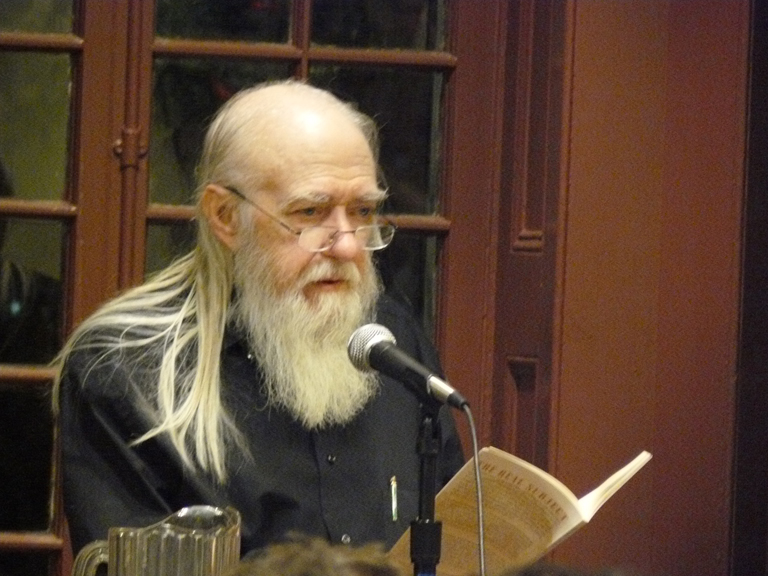 This month at the Kelly Writers House got off to a great start with a visit from Rosmarie and Keith Waldrop, which yielded a number of new PennSound recordings.
First and foremost, we have the evening reading on November 4th by the husband and wife pair, which starts (after introductions by Jessica Lowenthal and Sarah Dowling) with a set by Rosmarie, who starts off with the prose poem series, "Lawn of Excluded Middle," from her 2006 collection, Curves to the Apple before moving on to a new sequence of prose poems, "Time Ravel." After a hearty round of applause, she warns the audience, "you're actually not quite rid of me yet," and brings up Keith for a joint reading from their collaborative experiment in the renga form, "Light Travels." After another introduction by Dowling, we have Keith's set which is drawn exclusivly from his 2005 Omnidawn collection, The Real Subject: Queries and Conjectures of Jacob Delafon, with Sample Poems. We've just uploaded the audio from this reading, and should have the video up and running in short order.
The next day, the pair sat down with Charles Bernstein to record individual two-part Close Listening programs, including intimate conversations — in which they discuss their compositional practices, influences and poetic development — and reading segments. Rosmarie chose "Holderlin Hybrids," from her 2004 New Directions collection, Blindsight, for her set, while Keith took the opportunity to read a broad retrospective of his work, sharing selections from A Windmill Near Cavalry (1968), Windfall Losses (1977), The Garden of Effort (1975), The Ruins of Providence (1983), A Ceremony Somewhere Else (1984), Hegel's Family (1989), The Locality Principle (1995) and The House Seen From Nowhere (2002).
You can hear these Close Listening programs, segmented recordings from the Kelly Writers House readings and much, much more by visiting PennSound's individual author pages for Rosmarie and Keith Waldrop.
Posted 11/19/2009 (link)
 All of us at PennSound send the heartiest of congratulations to Keith Waldrop, who won the National Book Award in Poetry this week for his collection, Transcendental Studies: A Trilogy.
The National Book Foundation's citation hails Waldrop, noting: "If transcendental immanence were possible, it would be because Keith Waldrop had invented it; he's the only one who could — and in Transcendental Studieshe has. These three linked series achieve a fusion arcing from the Romantic to the Postmodern that demonstrates language's capacity to go to extremes — and to haul daily lived experience right along with it: life imitates language, and when language becomes these poems, life itself gets more various, more volatile, more vital." You can read more about the award and Waldrop on The National Book Foundation's website, and if you haven't already checked out Waldrop's PennSound author page — including the new Kelly Writers House reading and Close Listening programs we mentioned earlier this week — then you'll definitely want to do so now.
Of course, Waldrop's win means that two excellent collections by writers near and dear to both PennSound and our many listeners — Rae Armantrout's Versed and Ann Lauterbach's Or to Begin Again — did not win. Nevertheless, we congratulate them on being part of a particularly exciting and broad-minded list of finalists, and reiterate our wish that all three could have won. While we're issuing fantasy proclaimations for prestigeous literary awards, could we get a Nobel Prize in Literature for John Ashbery as well?
Posted 11/20/2009 (link)
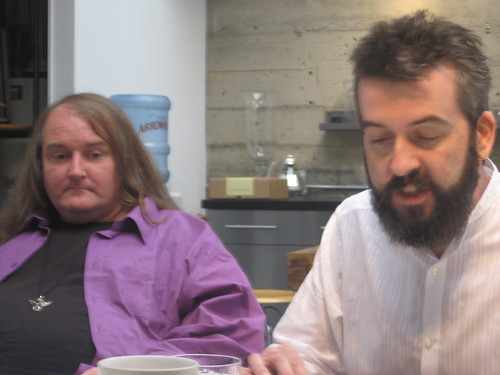 Today, we're closing out an exciting week with new recordings by two of our favorite local-grown poets — the always-dynamic duo of CAConrad and Frank Sherlock — taken from the archives of A Voice Box. Recorded September 11, 2009 at Small Press Traffic, the two poets were invited to discuss "Class/Warfare," which each approaches through a combination of poetry and conversation in lengthy individual sets.
Conrad's set starts with a discussion of Philadelphia locales and his plans for performance art involving the Liberty Bell and dark chocolate before moving on to his poetry — first, a number of poems from (Soma)tic Midge (including, in honor of the day, "from the womb not the anus WHITE asbestos snowfall on 911"), followed by two newer "(Soma)tic Poetry Exercises," along with the poems composed by these methods. Next comes a series of poems from The Book of Frank, and he concludes the set with readings from his other new book, Advanced Elvis Course.
Sherlock begins with two selections from his latest collection, Over Here — "This Could Be a Day of Historical Interest" and "Spring Diet of Flowers at Night" — before moving on to his post-Katrina collaboration with Brett Evans, Ready-to-Eat Individual. Next comes "Wounds in an Imaginary Nature Show," which the poet dedicates to the Bay Area poets (in particular, David Buuck and Juliana Spahr) who came to his aid several years back when he was struck with a life-threatening case of meningitis. This leads to a discussion of torture both international and domestic, governmental and personal — "they try to spread democracy," Sherlock avers, "but all they spread's perversion" — which leads into the poem "XOXO." He continues with shorter poems from Over Here ("Ouch Ouch," "Baby Baby") and another excerpt from Ready-to-Eat Individual, before concluding with the title poem, "Over Here."
Speaking of Conrad, we recently posted another new recording from the poet: his October 2009 appearance on the Joe Milford Poetry Show, which runs nearly two hours long. You can hear this, along with recordings from the Segue Series, and a PennSound-produced Studio 111 Session on his PennSound author page. Sherlock's Studio 111 Session, as well as readings at the Bowery Poetry Club, the Kelly Writers House and other locales, can be found on his PennSound author page, and stay tuned for The City Real & Imagined: Philadelphia Poems, a collaboration between the two poets and longtime friends, coming out this January from Factory School.
Posted 11/23/2009 (link)
 While we're justifiably proud of the diverse array of American voices represented in the PennSound archives, we're equally glad to be able to provide our listeners with the opportunity to interact with poetry outside of the English-speaking world, through programs such as UPenn's Writers Without Borders series, among others. Today, we turn our attention to Russia for the latest Writers Without Borders event, a new two-part Close Listening program featuring poet Dmitry Golynko.
In the first program, Golynko reads a selection of his poetry, assisted by Eugene Ostashevsky, who reads his (and others') translations in English to complement the poet's Russian, and provides cultural and technical contexts for the works. The second set — a forty-minute conversation — begins with host Charles Bernstein asking Golynko about the influence of post-Cold War culture on his work (n.b. the program was recorded on the 20th anniversary of the fall of the Berlin Wall). His life almost perfectly bisected by this influential event, Golynko views that event as "a historic moment encompassing the highpoint of the heat of catastrophic socio-political changes, as well as a melting-pot moment characterized by a huge influx of novel cultural influences and vast amounts of knowledge that had been kept in secret by official party censorship in the previous epoch," however, he's quick to note that "this doesn't mean that the state of war and emergency was banished from Post-Soviet cultural process. Quite the opposite is true: language itself turned out to be a battlefield where a fierce contest between controversial layers of everyday speech resulted in the effect of immersion in incessant warfare." This leads to questions about the political stance of the poet's work, as well as the evolving gender-consciousness that's present there.
In the program's second half, Bernstein asks Golynko about his interest in "the tension between the poetry archive [...] and other non- or even anti-archival sites for poetic thinking and action." "I'm really fascinated with poetry archives like PennSound and consider this to be fruitful and fantastic work," he observes, however such projects force him to wonder whether "writing itself tend[s] towards the further archivization and retention in cultural memory or does it tend towards a spontaneous emergence from an inexplicable source?" His "dubious and controversial" answer is that "poetical utterance stretches between archivization and spontaneity and the site for its occurrence resides at the point of the elusiveness of poetry itself, which could disguise it in vernacular language or in the idiosyncratic voice of a phantom authority, but cannot be caught in its force field."
The show concludes with Golynko discussing his role as an art critic and its effects upon his writing. He sees "poetry and critical-academic activity [as] two completely separate professional fields, two crafts which in principal cannot be mixed together." In the early 1990s, he saw "art criticism as the most necessary form of intellectual production," due to art's role as "an instrument, on one hand, of daring and future-oriented aesthetic search, and on the other hand, of immediate reaction on social catastrophes," however he notes the increasing influence of the market upon the art world today, likening it to "a glamorous variety show." Returning to the role of poetry, he ends by observing that "[q]uite possibly, the reformist task now standing before poetry and art is one and the same: to produce a community, elite and at the same time dialogically open, which could respond to the problematic of the loss of the concrete human individual in the context of globalized cultural processes."
On Golynko's PennSound author page, you can also hear a reading (the date and location of which are unknown) featuring the poems "Springs of Joy," "Unfounded offences / some peculiarities / tense expectations" and "Elementary Things." To learn more about Writers Without Borders and listen to recordings of previous events, visit our Writers Without Borders series page, and finally, don't forget to check out our Close Listening home page for dozens of programs from the past five years.
Posted 11/25/2009 (link)
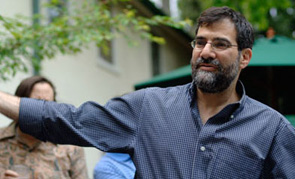 Thanksgiving day will soon be upon us, and to mark the occasion, PennSound co-director Al Filreis has put together a new PennSound Podcast (with the help of the fabulous Jenny Lesser), featuring a half-dozen poets who approach the topic of thankfulness from a number of different directions, sharing "marvelous expressions of gratitude, due honor, personal appreciation, friendship"
First up is Amiri Baraka's paean to jazz pioneer John Coltrane, "I Love Music," which is followed by Ted Berrigan's "Poem (for Larry Fagin)" (who is quite lovely, while the poet himself is lame). Next up is a more recent recording by Robert Creeley's tribute to fellow poet Eddie Linden, "Thanks." The podcast's second half begins with Jerry Rothenberg's "A Letter to Paul Celan, in Memory, December 1975" (a poem Filreis requested during the Rothenberg's recent visit as a Kelly Writers House Fellow in 2008), before concluding with two modernist titans: Louis Zukofsky's "Glad They Were There" (from section 29 of Anew) and William Carlos Williams' "Light-Hearted William. All six poets shed new light on just what we can be thankful for, and all six are likewise poets we're very glad to have as part of our archives.
You can listen to this podcast, and the previous eighteen in the PennSound Podcast series, by clicking on the title above, and for more (marginally) Thanksgiving-themed poetry, check out this vintage PennSound Daily entry which finds confluences between the holiday and Kenny Goldsmith's conceptual classics, Traffic and The Weather. All of us at PennSound would like to thank you, our listeners, for your continued interest, and extend our sincere hopes that you'll be spending Thanksgiving surrounded by those who mean the most to you.
Posted 11/30/2009 (link)
 We're starting the week off with a trio of recent author pages, bringing together both previously-available and just-uploaded recordings for the newest additions to the PennSound roster.
First off is poet and painter Basil King, whose life has lead him from England to Black Mountain College and San Francisco before setting in Brooklyn some forty years ago. On his PennSound author page, you can listen to a reading from the Prose Prose series at New York's Side Walk Cafe earlier this month, which features nearly a half hour from his book Warp Spasm (the first time he's read this material in his hometown).
Next up is our new author page for Canadian poet Christopher Dewdney, which includes three readings from the late seventies through the early nineties. This past summer, we added a pair of vintage Segue Series Readings from its first home, the Ear Inn — the first recorded February 27, 1988, followed by a November 23, 1991 set. Our newest addition is a 1978 talk on "Parasite Maintenance," recorded as part of the Bob Perelman-curated Folsom Street Talks series.
Finally, we've also created a new author page for New Narrative innovator Robert Glück, which brings together his November 12, 2002 reading as part of the Line Reading Series and a germinal talk on "Caricature" at San Francisco's New Langton Arts Center in 1983.
To listen to any of the recordings mentioned above, click the links on each authors' name, and be sure to visit PennSound's Authors Homepage, where you'll find a comprehensive list of more than four hundred writers for whom individual PennSound author pages exist, from Helen Adam to Magdalena Zurawski.
|
PennSound Daily archive
2025
2024
2023
2022
2021
2020
2019
2018
2017
2016
2015
2014
2013
2012
2011
2010
2009
2008
2007
|











